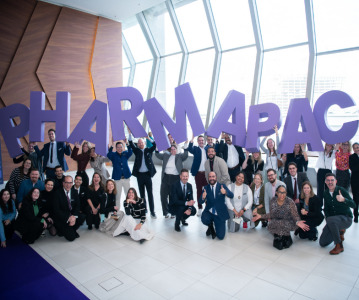Technology revolutionising drug substance development: CPHI North America Interview
.png)
From one of the content tracks at CPHI North America in Philadelphia, USA, in May, a lightning round talk was presented on 'Combining Biology and Chemistry for Smart Manufacturing', from Masha Kononov, Ingenza. In the following interview Kononov goes into more depth on her presentation.
Please could you introduce yourself and the work you do at Ingenza?
My name is Masha Kononov, and I am the National Director of Business Development for Ingenza. Here in the United States the focus for the company was to grow our business in 2023 throughout the continent. By training, I'm a scientist and molecular biologist, and I spent about 15 years in that space before moving into business development, and in the last 15 years of my career, I've been in commercial roles, predominantly in the CDMO space, both in drug substance and drug product.
Could you give us a brief overview of your talk today?
The talk was focused on introducing our platform technology, which we believe is revolutionising drug substance development. It does that through unique components within the platform that make the process better. It’s robust, quicker, and 100% successful. The reason why we say 100% is that it's based on actual data and success stories from our clients. We have a unique advantage in having multiple biomanufacturing hosts to choose from, since the ideal host can give you the best performing outcomes. Of course, that's all driven by what our clients require; whether you need to improve your productivity, product stability, eliminate antitoxins or whatever other challenges you might have. By screening multiple hosts and doing it early enough in the development, we are de-risking the process, and maximising successful outcomes. Being able to align our capabilities to your need is where the 100% success rate comes from. So that was really the focus of the presentation.
Seeking solutions early in development can mean greater upfront costs. Does this make some clients hesitant and therefore willing to face some risks later down the line instead?
It can depend on a lot of things, including backgrounds, but we probably see this a little bit more with start-up companies that are driven by timelines, with constraints around budget. They often try to withhold from more thorough research and development in the earlier stages. However, we see more and more new therapeutic targets are failing or coming up against greater challenges.
After phase one, people realise that it is worth it to invest early on because you really aren't saving by failing to mitigate those downstream obstacles. Ironically, we do get quite a few requests from companies that have already completed phase one when they realise that they don't have a satisfactory process to make high quality drug substance in the amounts they need for phase two. What happens at this point is they have an ambitious timeline, but the timeline is no longer achievable, because now you have to take a step back and optimise what you have.
In a nutshell, it's all about your personal risk-taking.
Saying that, we have talked to a lot of companies, including many startups developing new entities, whether small molecule or biologics. As an aside, we predominantly focus in the protein space, and recombinant proteins are complicated, so we see more and more difficult-to-develop modalities. That brings a challenge, and people know that it's going to be expensive, risky, and time consuming, so they really do want to get it right from the get go. This can dictate the fact that you do need to invest in these development de-risking strategies earlier than you probably would have done if you were dealing with the simpler molecules.
The cost of making a mistake is going to be substantially larger, or you may even put you out of business. I think that's changing the view across the industry.
Do you see any common challenges that come up that your platform can help to overcome?
The common challenges if we are talking about biologics, proteins in particular, is expression level; everyone wants to have as much as possible. That's where our optimal host is important. Let me give you a real example. Many companies have been using CHO. And the reason for that is because they are developing proteins, often antibodies, but let's say in a couple of cases, it’s bi-specific antibodies, which are different from the monoclonals because they are more complex, and now they're realising that CHO is not working for them. So they are questioning where to start.
Stability seems to be another area of concern, particularly for biologics and cost of goods. However, I would say that cost of goods depends on the company again, so definitely yield, productivity and stability. Analytical is a big part of the challenge also, again depending on the complexity of your molecule, you need to have technology for the specific analysis of what you're making.
In the presentation I talked about this characterisation of a very complex nanoparticle that carries eight different but related antigens. Using standard techniques, the differentiation of those antigens will be very difficult, but with advanced, analytical technologies you can. I think that's another area where people have started to struggle more, and that's where it becomes more and more important that you as a developer, have all those recent, key techniques that help to solve those challenges.
Are you seeing any trends in what your clients are developing?
This entire world of biologics is quite fascinating, because, people have so many new ideas as to what they can potentially develop as therapeutics. I think there's clearly more evidence now that certain modalities are more viable as an option, because those companies are getting into clinics. You know, definitely recombinant proteins, let's say with nanoparticles it's a hot field and I’m sure there are some companies that are in clinical stages.
I think more and more of those novel modalities are getting very close to, or are already in, early clinical development and that's part of the reason why this community is thinking about CMC more than ever, because before that it was all discovery, and before that it was all about, what we choose, how do we make it, is it potent or not? But now developers are thinking how do I get it into the clinic? How do I test it? That's part of the CMC process, and the process development is an integral part.
People are realising increasingly that you need to think outside the box, because standard manufacturing technologies and standard means of testing may not work.
What are the trends in the broader industry that you’re seeing? Are there trends in biologics towards more green chemistry?
I think green chemistry is definitely an area that a lot of companies, particularly bigger companies, are focused on, but I think it's more applicable to small molecules rather than biologics.
Targeted delivery is one of the areas that more and more people are focusing on, particularly for those indications that can benefit from that, such as cancer. For personalised medicine for instance, toxicity of the drugs is a big deal. So if you can have a targeted way of delivering it, that's a huge advantage.
Even though we are not necessarily directly in the drug delivery space, nor the formulation and development space, we hear it all the time, because when you start talking to the client, even for drug substance development, we always consider what the final form would be, because that also dictates how much material you need to generate. And that also may dictate other factors in terms of what you need to avoid in your process. That's definitely a major focus, to have an efficient process that reduces the cost of goods and uses techniques and procedures that also reduce time and waste, and therefore the environmental impact.
Do you think CPHI provides a necessary place to discuss these topics and learn more?
I've been coming to CPHI regularly. It's definitely valuable. CPHI brings together a strong community, focused on drug substance. I feel there should be more emphasis on biologics because I think many people only relate CPHI with small molecules.
While it is fair to say that 60% of all new drugs in development are still small molecules, 40% are biologics. At CPHI you are still very much technology and science driven, but it could be valuable to expand on topics such as biologics.
See the full presentation online on demand here.
Related News
-
News Pfizer may shift production back to US under Trump pharma tariffs
At the 45th TD Cowen annual healthcare conference in Boston, USA, Pfizer CEO Albert Bourla outlined the potential for Pfizer to shift its overseas drug manufacturing back to the US as pharmaceutical industry players weigh their options against Presiden... -
News Women in Pharma: Connecting accessible pharma packaging to patients – a Pharmapack Special
Throughout our Women in Pharma series, we aim to highlight how CPHI events encourage discussions around diversity, equity, and inclusion initiatives in the pharmaceutical industry. -
News CPHI Podcast Series: Packaging expert perspectives at Pharmapack 2025
This month's podcast episode sounds a little different, covering the latest event in Paris – Pharmapack 2025. Digital Editor Lucy Chard speaks to several experts direct from the floor of the show, bringing you right in on the action.&nbs... -
News Closing 2024 with Editors' picks of top articles from the past year
Coming to the end of 2024 and it’s certainly been a busy year, for CPHI and for the rest of the pharmaceutical and healthcare industry. Topics of conversation throughout the last 12 months have been varied, touching on the technical, to the polit... -
News SCHOTT Pharma’s sustainable journey with CPHI
Sustainability is of paramount importance in the pharmaceutical industry. See how a recent partnership between CPHI and SCHOTT Pharma has helped to highlight and accelerate their sustainability journey to reach global goals. -
News CPHI Podcast Series: Investing in a vision for the future of life sciences
In this episode Lucy Chard is joined by Rajiv Khatau to discuss the importance of looking into new therapeutic areas and some of the more niche areas of pharmaceuticals, and investing in the future of the industry. -
News Lessons from CPHI Milan 2024: Sunny Intervals for Pharma Manufacturing?
As the 2024 CPHI conference wrapped up in Milan, we caught up with L.E.K. Consulting – a global strategy consulting firm with deep expertise in pharma manufacturing – to discuss evolving market perspectives and business outlook. -
News Women in Pharma: Reflections from Behind the Scenes
In this instalment of our monthly series, the team that brings you the Women in Pharma series each month sits down for a heart-to-heart on what the series means to them, and how they hope to continue their work in the future.
Recently Visited
Position your company at the heart of the global Pharma industry with a CPHI Online membership
-
Your products and solutions visible to thousands of visitors within the largest Pharma marketplace
-
Generate high-quality, engaged leads for your business, all year round
-
Promote your business as the industry’s thought-leader by hosting your reports, brochures and videos within your profile
-
Your company’s profile boosted at all participating CPHI events
-
An easy-to-use platform with a detailed dashboard showing your leads and performance







